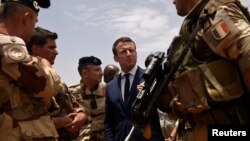The United States is wary of a French push for the U.N. Security Council to authorize a West African force to combat terrorism and trafficking in the Sahel region because it does not want the world body to help fund it, diplomats said on Thursday.
France circulated a draft Security Council resolution on Tuesday to the 15-member body that would approve the force using "all necessary means" and ask U.N. chief Antonio Guterres to report on options for U.N. support to the operation.
Closed-door negotiations began on Wednesday, and diplomats said the United States would prefer the council give its blessing in a statement instead of a resolution and encourage bilateral support for the West African force.
The European Union has already committed $56 million to the Sahel force.
The United States supports the force "in principle as a potentially important example of African efforts to fight extremism on the continent," a U.S. official said, but noted that a U.N. resolution was not the only way to provide political
support.
The official said U.N. authorization was not needed because the force already had the approval of the countries where it would deploy, likening it to a joint task force in the Lake Chad Basin fighting Boko Haram, which has council political support but no official authorization.
"Further, we find the mandate of the force way too broad, lacking precision; and would set a dangerous precedent by providing authorization for lethal force for a broad spectrum of activities including operations to 'eradicate' undefined
criminal networks," the official said.
The vast, arid Sahel region has in recent years become a breeding ground for jihadist groups — some linked to al-Qaida and Islamic State — that European nations, particularly France, fear could threaten Europe if left unchecked.
"The African Union and the secretary-general have asked the council to authorize this Sahel force," France's U.N. ambassador, Francois Delattre, told reporters on Thursday. "It is important that the whole Security Council gets united behind this draft."
The United States is currently trying to cut the cost of U.N. peacekeeping and is reviewing each of the 16 missions as they come up for Security Council renewal. Washington is the largest contributor, paying 28.5 percent of the $7.9 billion peacekeeping budget.
President Donald Trump's fiscal year 2018 proposed budget would cut $1 billion from the U.S. contribution to U.N. peacekeeping, although Republicans, who control both houses of Congress, and Democrats have said they do not support drastic cuts.
Last year, the Sahel nations — Niger, Mali, Chad, Burkina Faso and Mauritania — proposed establishing special units, each of around 100 well-trained soldiers, which would be deployed in areas where jihadist groups are known to operate.
They would complement the efforts of regular armed forces, a U.N. peacekeeping mission in Mali and France's Operation Barkhane, which has around 4,000 troops deployed across the five Sahel countries.
France intervened in 2013 to drive back militants who had seized northern Mali a year earlier. However, militants continue to attack Mali and its neighbors.





